|
|
|
Sort Order |
|
|
|
Items / Page
|
|
|
|
|
|
|
| Srl | Item |
| 1 |
ID:
123498
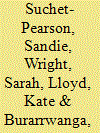

|
|
|
|
|
| Publication |
2013.
|
| Summary/Abstract |
This collaboratively written paper takes the reader on a journey to Bawaka, in North East Arnhem Land, northern Australia, to explore how a Yol?u ontology of co-becoming can inform natural resource management (NRM) theory and practice. By focusing on the process of gathering and sharing miyapunu mapu (turtle eggs) and the foundational Yol?u concept of wetj, we challenge NRM to take seriously Indigenous ways of knowing and becoming, and to attend to the vibrant, more-than-human relationality of our world. We discuss this relational cosmology, highlighting the importance of being aware and attentive, as well as the underlying ethical imperative of responsibility and obligation. We argue that as important as the concept of Caring for Country has been for NRM in Australia, it is critical that the human imperative to care for Country is balanced with a multi-directional and beyond-human understanding of the human-Country relationship. This requires engagement with the ways Country also cares and acknowledgement that humans are part of Country and not separate from it. We therefore propose a reframing, that we not only Care for Country but Care as Country. This has implications for understanding the ways that humans can and should relate to the environment as they exist together through co-becoming.
|
|
|
|
|
|
|
|
|
|
|
|
|
|
|
|
| 2 |
ID:
123499
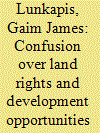

|
|
|
|
|
| Publication |
2013.
|
| Summary/Abstract |
Confusion over land rights issues and opportunities created through communal titles may just be rhetoric to some, but for the poor rural communities, it is a matter of survival. As this paper reveals, this may be due to contradictory interpretations between native communities and state agencies of what constitutes native customary rights. The methods and materials used are based on case studies in the state of Sabah, Malaysia with regard to the policies, programmes and projects that have been implemented in rural areas. This was made possible through interviews with key informants, textual analyses and state documents, and through observations of projects implemented in the rural areas of Sabah. Based on the information gathered, this paper reveals a worrying pattern of state and peoples' interactions over the provision of communal titles and state projects.
|
|
|
|
|
|
|
|
|
|
|
|
|
|
|
|
| 3 |
ID:
123497


|
|
|
|
|
| Publication |
2013.
|
| Summary/Abstract |
Howitt () claims that state control over mineral and energy resources and developer-Indigenous relations constitute the 'active erasure' of Indigenous knowledge and governance. The cultures and interests of Indigenous players are diverse and at times conflicting during Indigenous-mining interface, and collective bargaining has been shown to substantially weaken these positions, especially in regard to those Indigenous players primarily concerned with the protection of localised heritage. This paper explores a case study from a remote region of South Australia to document this erasure and its implications and to advocate decolonisation of the regulatory interfaces between mining and Indigenous peoples in resource, environmental and heritage governance. It adopts an Indigenous standpoint for research and argues the need for academic research to accept responsibility for some weaknesses in existing systems. The experiences of Adnyamathanha people are used to support an argument that Indigenous empowerment through informed decision-making and a decolonising engagement strategy are yet to be fully realised as key components of an effective interface between Indigenous and commercial players.
|
|
|
|
|
|
|
|
|
|
|
|
|
|
|
|
| 4 |
ID:
123500


|
|
|
|
|
| Publication |
2013.
|
| Summary/Abstract |
The paper investigates how political processes shape the institutional arrangements and then affect performance of Indigenous irrigation systems. External interventions in the form of coercive authority and new rules resulted in a shift of resource governance from farmers to state officials in state-administered areas of Pakistani Punjab during British rule. The primary farm-level data were collected from 280 spate irrigation farmers from four systems. The analysis of systems-level agricultural production and institutional performance indicators of irrigation systems in identical environments is conducted. We examined Elinor Ostrom's Design Principles that characterise long-enduring, self-governing resource systems to compare robustness of tribal and state-administered area spate irrigation institutions. The state intervention in Indigenous irrigation systems weakened collective action and distorted equity in access to customary irrigation rights in state-administered areas. The study concludes that tribal areas systems working without state intervention have evolved effective local irrigation management institutions based on social and ecological values to ensure sustainable self-governing resource regimes.
|
|
|
|
|
|
|
|
|
|
|
|
|
|
|
|
| 5 |
ID:
123494
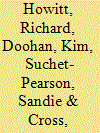

|
|
|
|
|
| Publication |
2013.
|
| Summary/Abstract |
Focusing on the coexistence of competing and contested interests in intercultural natural resource management (NRM) systems in Australia and Malaysia, this paper explores the ways in which ontological pluralism and the interplay of socio-cultural, political-economic and biophysical influences shape NRM systems. We aim to foster a discursive space in which to reframe the challenges of capacity building in the rapidly changing spaces of intercultural NRM systems. The paper synthesizes the conceptual arguments of field research to conclude that capacity deficits of dominant institutions, processes and knowledge systems drive many systemic failures in land and sea management affecting Indigenous peoples. We advocate urgent action to build intercultural competence and new capacities and competencies in those institutions. The paper reframes intercultural NRM in terms of coexistence and invites wider debate about these 'new geographies of coexistence' in intercultural NRM systems.
|
|
|
|
|
|
|
|
|
|
|
|
|
|
|
|
| 6 |
ID:
123496


|
|
|
|
|
| Publication |
2013.
|
| Summary/Abstract |
This paper directly challenges the persisting argument that in the host-(uninvited) guest relationship of Kimberley coastal tourism in Australia's far northwest, Traditional Owners (the hosts) have a pedagogic responsibility to first educate the tourism industry (the guests) of their impacts on them in order to facilitate culturally appropriate and sustainable tourism experiences. We contend that such an argument reflects a deeply entrenched context of erasure and power imbalance between Australian Aboriginal and non-Aboriginal people. We highlight, using three decades of public records, the fact that government and industry have ignored and continue to ignore knowledge and learning shared by Kimberley Aboriginal peoples in attempts to rectify serious issues of cultural impacts and risks to visitors arising from unsanctioned tourism activities on Traditional Owners' land and sea country. We argue for the possibility of tourism operating in a mutually satisfactory hybrid space in which acknowledgement, tolerance and respect discharges the need for understanding different ontologies that operate within that space but provides the potential for learning. Using Bourdieu's notion of transformative practice, we propose that the development of such a hybrid space could transform the problem of unsanctioned tourism access to the Kimberley coast into an iteration that could facilitate its taming and thus a shift towards sustainable practices based on mutual recognition and respect.
|
|
|
|
|
|
|
|
|
|
|
|
|
|
|
|
| 7 |
ID:
123493


|
|
|
| 8 |
ID:
123495
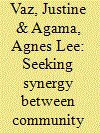

|
|
|
|
|
| Publication |
2013.
|
| Summary/Abstract |
Sabah in Malaysian Borneo contains a range of diverse ecosystems and some of the richest concentrations of biodiversity in the world. Yet the state's existing protected area network is too fragmented and of insufficient size to safeguard biodiversity in the long term. Experts have emphasised the need for a landscape level approach to shore up conservation areas through the creation of ecological corridors of compatible mixed use. In light of the 2003 Durban Accord which signalled a shift towards greater levels of community participation in conservation, this article features the efforts made by the state to explore the potential role of Indigenous and Community-Conserved Areas (ICCAs) in strengthening biodiversity conservation. Selected case studies are used to showcase some of the ways ICCAs are already making important contributions to safeguarding ecological services and maintaining habitat connectivity in the state. Recognising the role of indigenous and local communities in sustaining Sabah's unique biocultural landscapes is a critical component of a long-term approach to sustaining irreplaceable natural heritage. Sabah's legal framework actually contains sufficient provision for greater synergy between community and state-based governance of biodiversity areas, yet aspects of Sabah's political economy must be addressed before this ideal can be realised.
|
|
|
|
|
|
|
|
|
|
|
|
|
|
|
|
| 9 |
ID:
123501
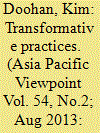

|
|
|
|
|
| Publication |
2013.
|
| Summary/Abstract |
Failure to recognise or acknowledge and respond to local cultural manifestations of Indigenous peoples' attempts to maintain or reassert themselves in spaces of intercultural engagement in resource management denies the power of their own cultural foundations and principles. This paper reviews experience of informal negotiations at the Argyle Diamond Mine in Western Australia. It argues that giving careful consideration to specific cultural practices and processes associated with place and the social relations these practices engender facilitates development of transforming practices that change outcomes.
|
|
|
|
|
|
|
|
|
|
|
|
|
|
|
|
|
|
|
|
|